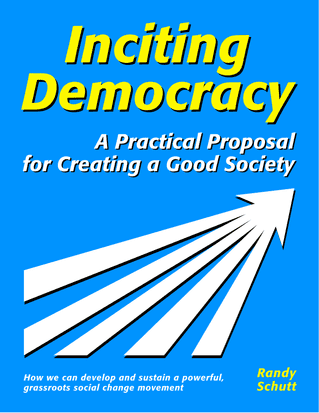Is It Possible to Create a Good Society?
Though we all want a good society — and we can see that it is possible to make society better in some ways — most of us believe that it is impossible to create a truly good society. The obstacles just seem too great. However, people in our society routinely solve difficult problems. From forging "a new nation, conceived in liberty" to designing jet aircraft and computers, we are problem solvers who like to fix things and make life better.
It is this can-do spirit that inspired Randy Schutt to cut through the haze of myths and fears surrounding social change and to focus on solving the problem of creating a good society. In Inciting Democracy: A Practical Proposal for Creating a Good Society (SpringForward Press, 2001), he describes what he has found.
Trained as an engineer, Schutt investigates what obstacles stand in the way of creating a good society, examines the solutions people have found to overcome these obstacles in the past, assesses the resources needed to implement solutions, and lays out a practical, 80-year strategy for creating a positive, democratic society.
Based on his long experience working for change and his extensive study of the social science literature, Schutt finds five primary obstacles that stand in the way of creating a good society:
- an adverse power structure that entices and coerces us all to support inhumane institutions,
- cultural conditioning that makes us accept destructive social norms (such as individualism, materialism, militarism, racism, sexism, classism, homophobia),
- dysfunctional emotional conditioning that makes it hard for us to work together (due to depression, low self-esteem, irrationality, rigidity, addictions, phobias, etc.),
- widespread ignorance of positive alternatives and social change methods, and
- a scarcity of resources among people of goodwill working for change.
Inciting Democracy will be available from SpringForward Press on September 10, 2001 for $23.95. This 320-page paperback book is 8.5” x 11” and contains 71 figures, 270 quotations, 233 annotated references, a bibliography of 110 other cited works, and a complete index. For a complete media kit, see http://www.springforwardpress.com.
— 30 —

